Physical Address
304 North Cardinal St.
Dorchester Center, MA 02124
Physical Address
304 North Cardinal St.
Dorchester Center, MA 02124
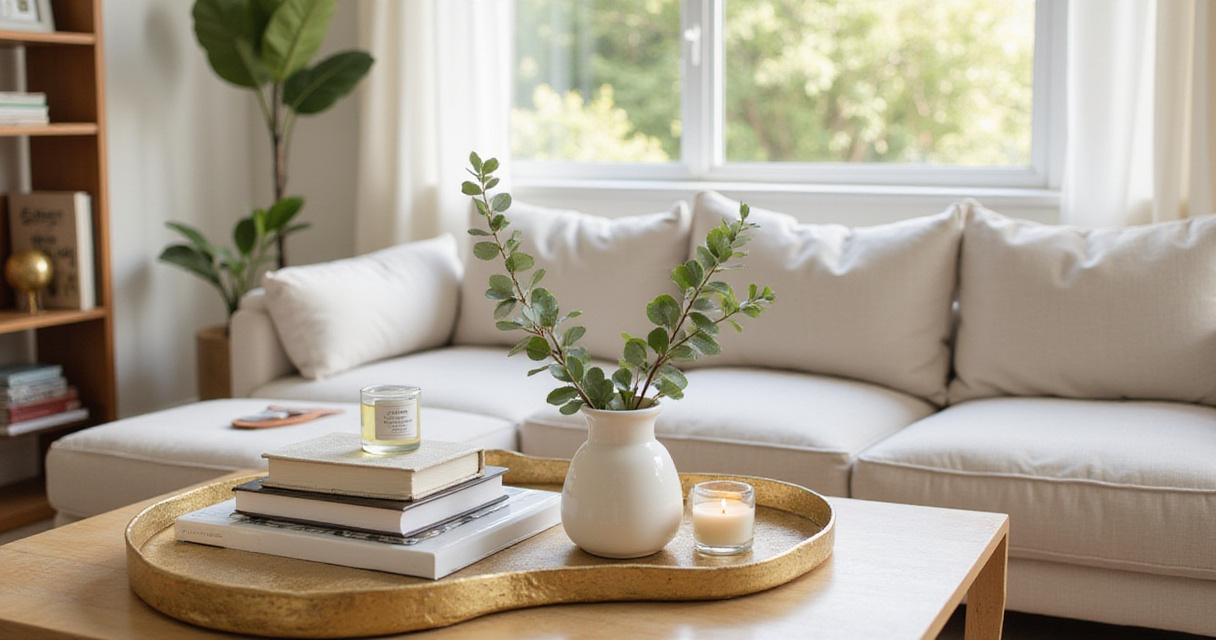
Transform your space with these 21 Mediterranean-inspired living room decorating ideas that bring coastal European warmth and authenticity to your home, from statement rugs to artisanal ceramics.
Is your living room missing that warm, inviting feel that makes you want to linger? As someone who’s spent years studying the sun-drenched interiors of coastal European homes, I’ve discovered that creating a truly captivating living room isn’t about following trends—it’s about crafting spaces that tell your story.
The heart of any home deserves special attention. Whether you’re working with a compact apartment or a sprawling villa, these Mediterranean-inspired living room decorating ideas will help you create a space that balances beauty with everyday livability. Let’s explore how to infuse your living room with that special Mediterranean magic that makes guests want to stay just a little longer.
What does it really mean for a rug to ‘anchor’ a room? It’s more than just placing fabric on the floor; it’s creating a visual foundation for your entire living space. A rug acts as the unifying element that seamlessly connects your Furniture Arrangement, preventing sofas and chairs from feeling like they’re floating aimlessly. In Mediterranean design, rugs often feature rich patterns that tell stories of heritage and craftsmanship.
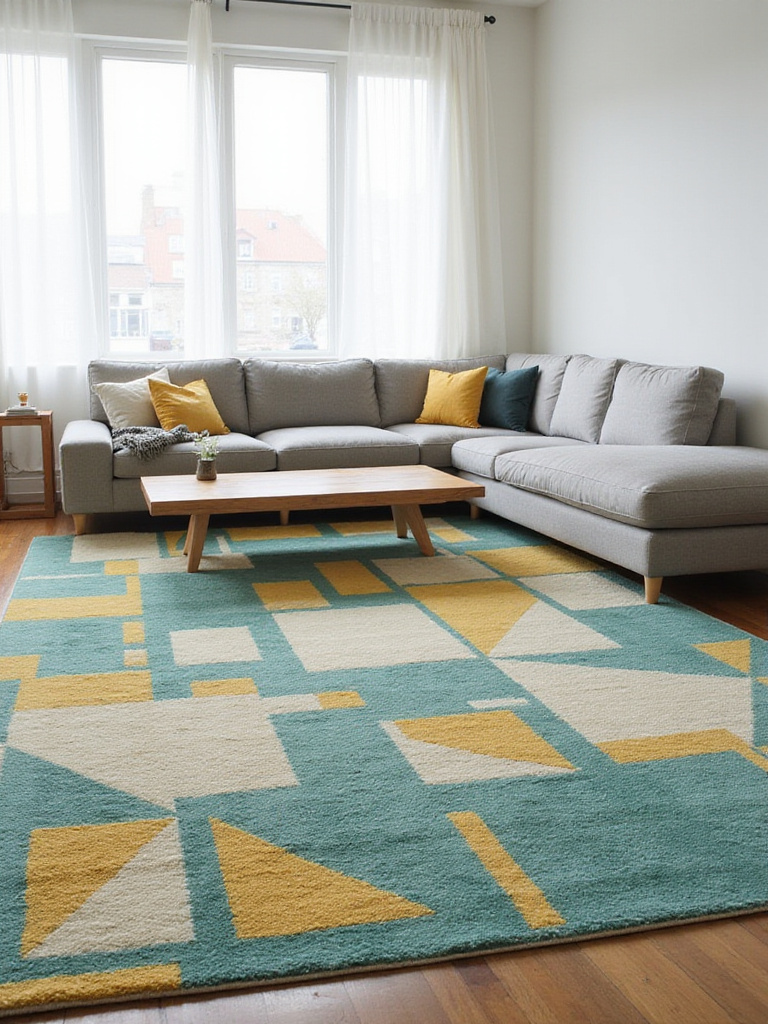
Choosing the right statement rug involves several key considerations. Size matters tremendously—ideally, all legs of your main pieces should rest upon it, or at least the front legs. In my coastal design practice, I’ve found that natural fibers like jute or sisal provide wonderful texture while complementing the earthy Mediterranean palette of terracottas, blues, and sun-washed whites.
“The right rug doesn’t just sit beneath your feet—it grounds your entire design story and sets the tone for everything that follows.”
The inspiration for this collection struck when I visited a small village in southern Spain, where local artisans still hand-weave rugs using techniques passed down through generations. Their patterns spoke of sea, sun, and centuries of cultural exchange.
Beyond their undeniable aesthetic appeal, Mediterranean plants bring something special to living room decorating ideas. Olive trees, with their silvery-green leaves, instantly transport you to Italian hillsides, while lavender adds both color and a subtle, calming fragrance. These plants aren’t just decorations; they’re living elements that breathe life and tranquility into your space, making it feel instantly more welcoming and connected to nature.
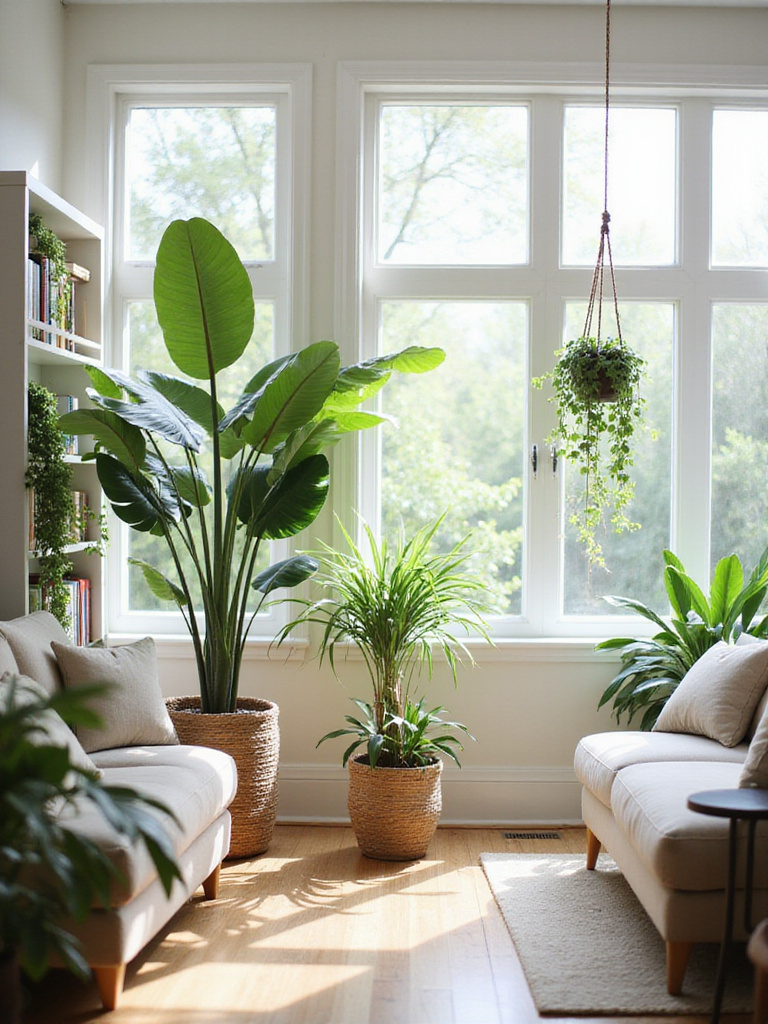
For those of us with busy schedules, many Mediterranean plants are surprisingly low-maintenance. Rosemary, succulents, and small citrus trees thrive with minimal attention and bring authentic regional character to your living room. I often recommend placing them in terracotta pots for that quintessential Mediterranean look—the contrast between the earthy containers and vibrant greenery creates visual magic.
What makes this choice better for our planet is that many Mediterranean plants are drought-resistant, requiring less water while still adding beauty to your space.
Natural light is a cornerstone of Mediterranean design, where sun-drenched interiors create that coveted warm glow. Mirrors are ingenious tools for amplifying this precious resource. They act as reflectors, cleverly bouncing sunlight around the room and redirecting light from windows into darker corners. In smaller coastal apartments I’ve designed, strategically placed mirrors have transformed cramped spaces into airy retreats that capture the essence of Mediterranean living.
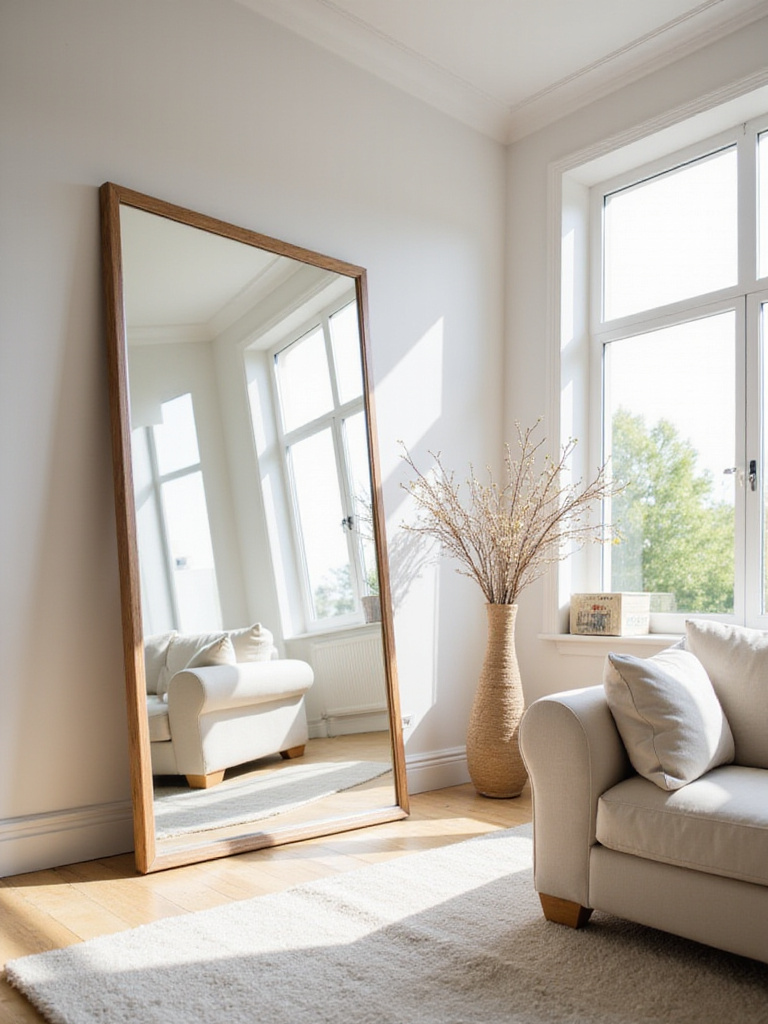
When positioning mirrors, consider what they will reflect. Placing a mirror opposite a window with a garden view effectively brings nature inside twice. In Mediterranean homes, mirrors often feature simple frames in natural materials or painted in coastal blues and whites. The reflective quality not only brightens the space but creates the illusion of greater square footage—a technique I’ve used countless times in vacation homes along the Spanish coast.
The unexpected environmental benefit comes from reducing your reliance on artificial lighting during daylight hours, saving energy while creating that authentic sun-kissed Mediterranean ambiance that makes living room decorating ideas feel more organic and connected to nature.
Imagine coming home to the gentle glow of evening light filtering through sheer curtains, landing on a corner filled with hand-loomed textiles in shades of azure, terracotta, and sun-bleached white. In Mediterranean design, textiles tell stories of regional craftsmanship—from Portuguese blankets to Moroccan throws. A truly cozy corner starts with comfortable seating, perhaps a low-slung armchair with curved lines reminiscent of seaside architecture.
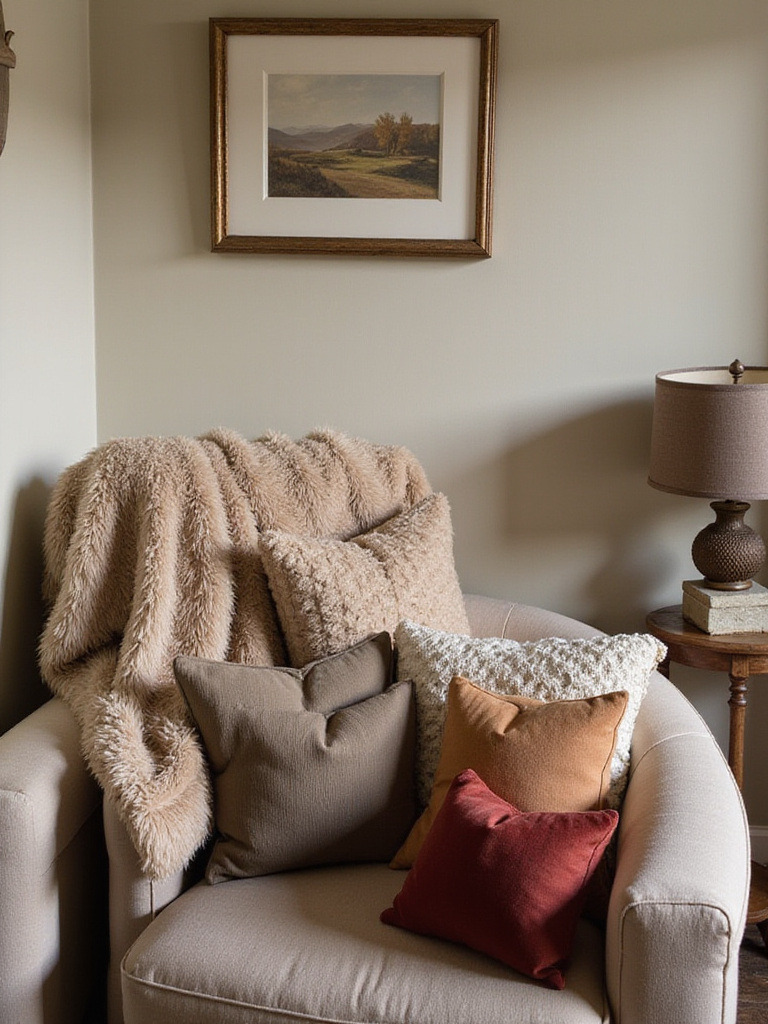
Choosing the right textiles means embracing both beauty and practicality. Look for natural fibers like linen and cotton that breathe well in warmer climates but still provide comfort. In my design practice, I often layer different patterns that share a common color palette—perhaps a geometric Greek-inspired throw over a chair with Sicilian-patterned pillows. The magic happens in this thoughtful layering that feels collected over time rather than purchased as a set.
The craftsmanship reveals itself in details like hand-knotted tassels, subtle embroidery, or the slubby texture of handwoven fabrics—elements that invite touch and create that sensory richness essential to authentic Mediterranean living room decorating ideas.
Wall art is the voice of your living room, imbuing it with personality and setting the emotional tone for the entire space. In Mediterranean-inspired living room decorating ideas, art often celebrates the region’s stunning landscapes—azure coastlines, sun-drenched olive groves, whitewashed villages cascading down hillsides. These images transport you instantly, creating a visual escape that transforms even the most landlocked home.
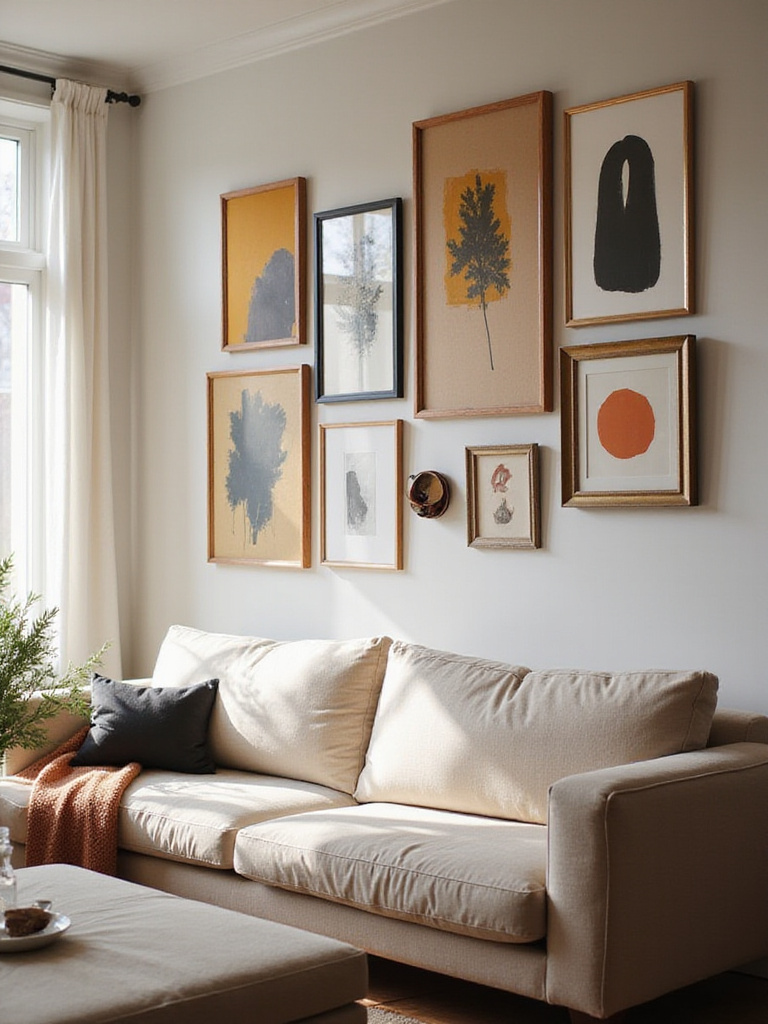
Choosing art that truly reflects Mediterranean aesthetics means looking beyond generic beach scenes. Consider vintage travel posters from the 1920s and 30s celebrating the Amalfi Coast or the French Riviera. Black and white photography of architectural details—a weathered blue door in Santorini or intricate Moorish tiles from Andalusia—adds sophistication while maintaining regional authenticity. In my designs, I often incorporate local crafts like hand-painted ceramic plates or framed textiles that bring genuine cultural elements to the walls.
The traditional methods used result in artwork with soul and character—qualities that mass-produced pieces simply cannot replicate. These authentic touches become conversation starters and memory triggers, connecting your living room to the rich cultural heritage of the Mediterranean basin.
The focal point in Mediterranean design often draws from the region’s distinctive architectural elements. A statement fireplace with a curved opening reminiscent of Spanish haciendas or Portuguese quintas instantly becomes the heart of the room. In coastal Mediterranean homes, large windows framing sea views naturally command attention, but you can recreate this effect by emphasizing any window with substantial molding painted in contrasting white against earthen walls.
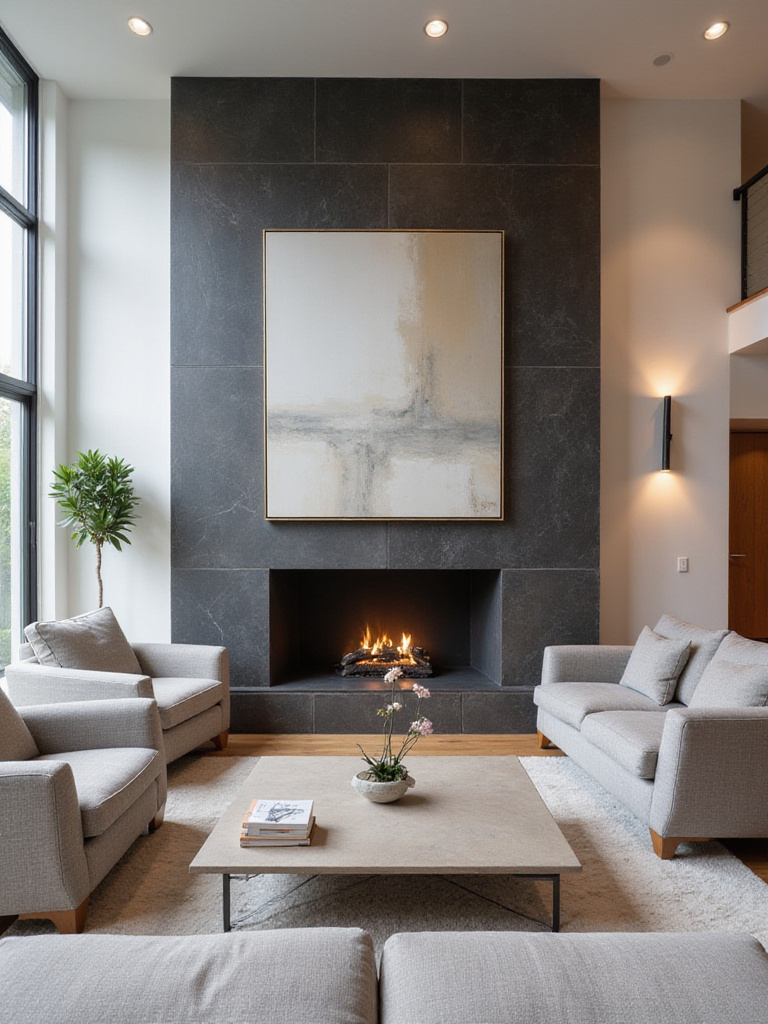
Why is having a focal point so crucial in Mediterranean-inspired living room decorating ideas? It brings structure and balance to the space while creating an authentic sense of place. Without this anchoring element, a living room can easily feel like a generic collection of furniture rather than a cohesive design with cultural roots. The focal point directs the flow of movement, naturally defines conversation areas, and cultivates the visual harmony that makes Mediterranean interiors so appealing.
The revival of this classic form comes with a twist in contemporary interpretations—perhaps a traditional arched niche updated with integrated lighting, or a rustic stone wall serving as backdrop for sleek, modern furnishings. These thoughtful focal points become the foundation around which your Mediterranean story unfolds.
Texture is the secret ingredient that prevents a Mediterranean-inspired room from feeling flat. Along the coasts from Spain to Greece, interiors feature a rich tapestry of textures—rough stucco walls, smooth glazed tiles, woven reed baskets, and polished wood worn by generations of use. This layering of tactile elements creates a sensory richness that makes Mediterranean living room decorating ideas feel authentic rather than themed.
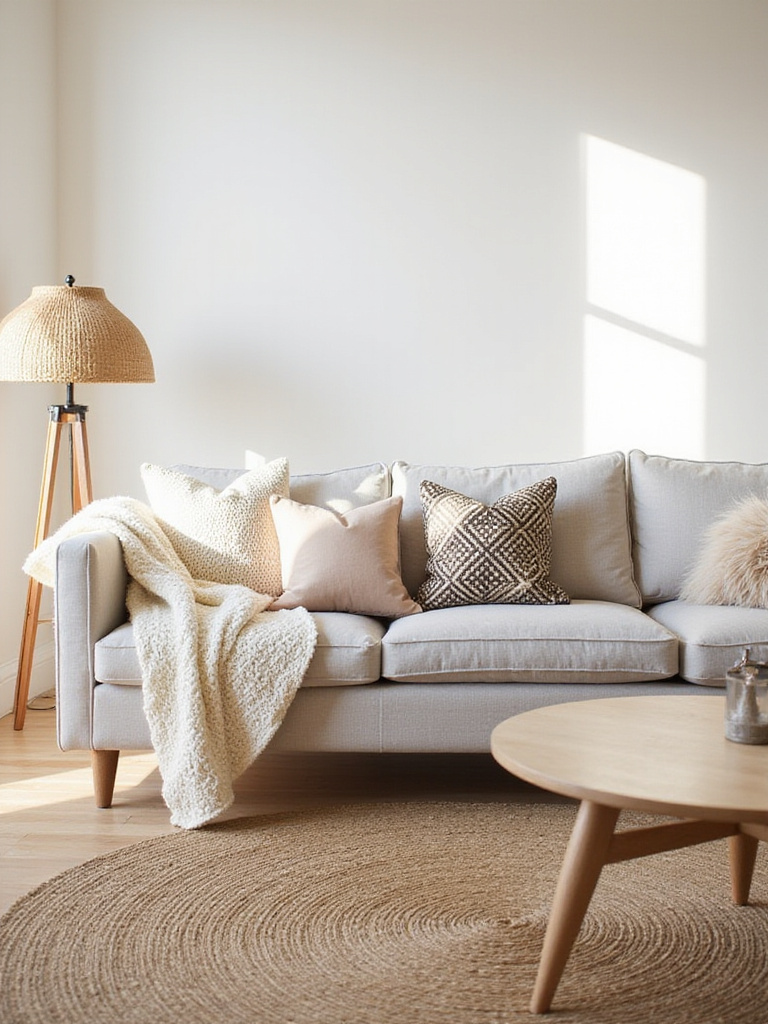
In my design practice, I encourage clients to incorporate textural contrasts: perhaps a rough-hewn wooden coffee table atop a smooth wool rug, or sleek ceramic lamps beside a chunky knit throw. Consider introducing traditional Mediterranean materials like terracotta, which brings warmth whether in flooring, accessories, or plant containers. Woven elements—from rattan light fixtures to wicker baskets—add visual interest while referencing the region’s long history of basketry and craft.
The artisans behind these designs began with simple, local materials transformed by skilled hands into objects of both beauty and function. This authenticity of material and craft is what gives Mediterranean interiors their timeless appeal and genuine character.
How does color influence the feeling of a Mediterranean-inspired living room? The region’s palette draws directly from its landscapes—the azure blues of the sea, the warm terracottas of tiled roofs, the creamy whites of sun-bleached buildings, and the verdant greens of olive groves. These colors aren’t just decorative choices; they’re emotional connectors that instantly transport you to specific coastal villages and sun-drenched terraces.
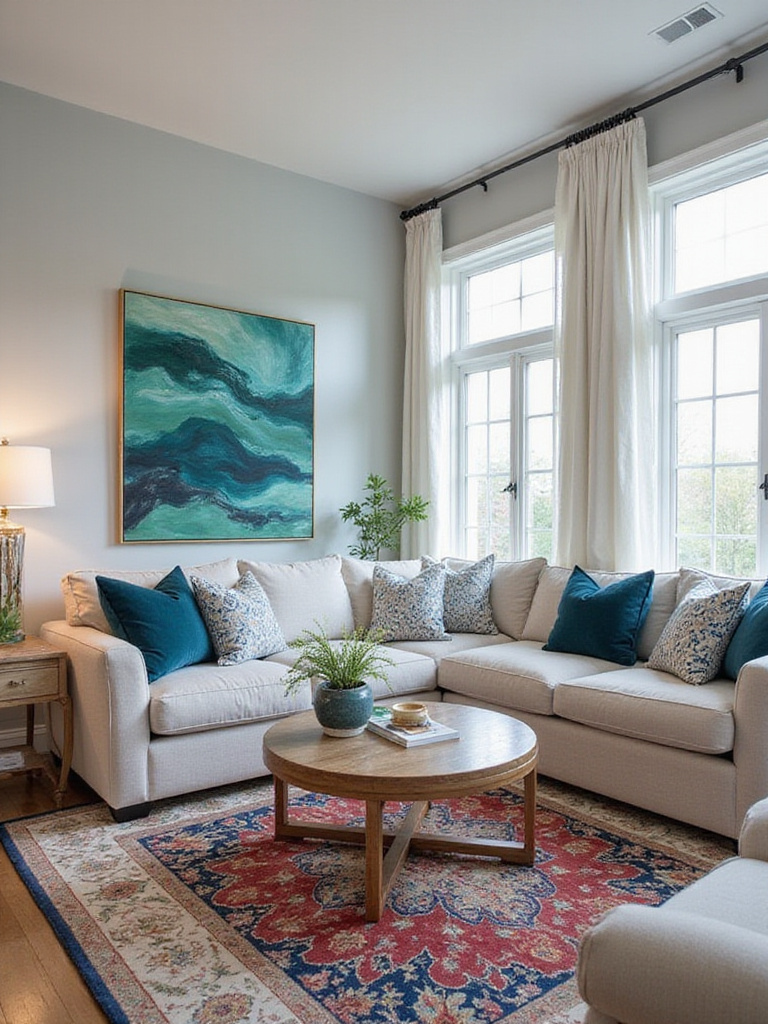
When implementing Mediterranean color schemes in living room decorating ideas, consider the quality of light in your space. Northern rooms might benefit from warmer terracottas and golds to create that sun-kissed feeling, while naturally bright spaces can handle deeper blues and greens. In my coastal projects, I often use white as a dominant color with strategic pops of blue—a combination that feels authentically Greek or Spanish while maintaining a clean, contemporary feel.
The interplay between the colors creates a visual rhythm reminiscent of waves against shore or wind through olive branches. This natural harmony explains why Mediterranean color palettes have endured for centuries, transcending trends to become timeless expressions of regional identity.
Mediterranean cultures celebrate togetherness, and their living room layouts reflect this social priority. Unlike formal arrangements where seating faces a television, traditional Mediterranean living room decorating ideas focus on creating intimate conversation circles that encourage face-to-face interaction. This arrangement fosters the kind of lingering, story-filled gatherings that define Mediterranean hospitality.
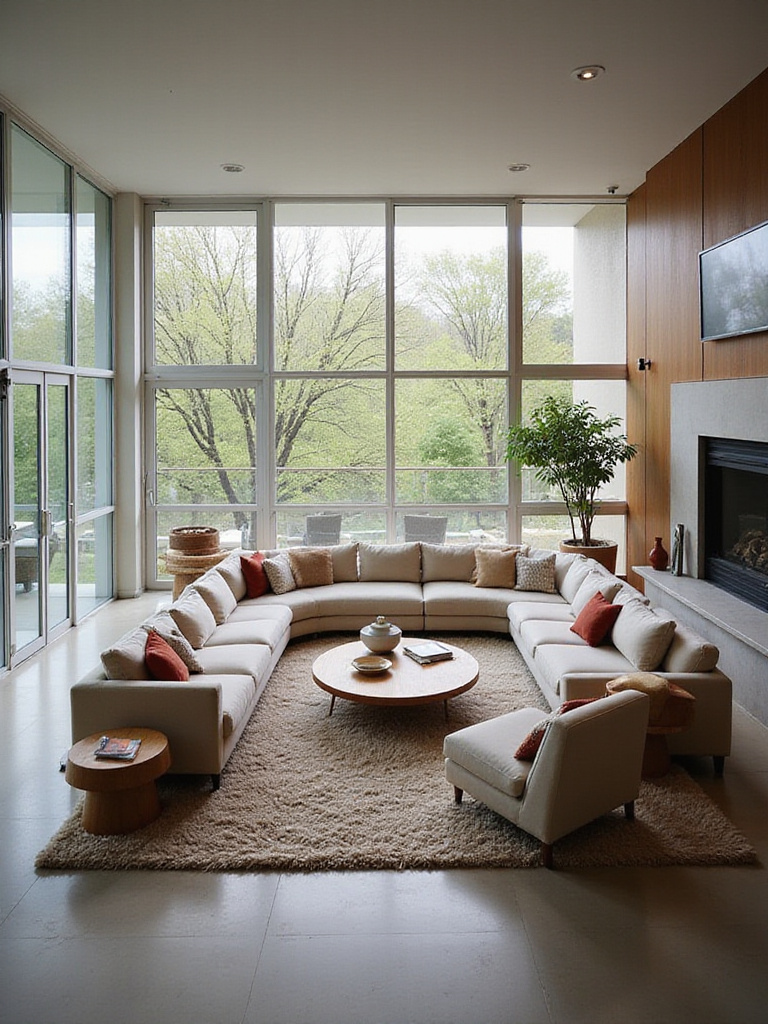
When planning your furniture layout, consider creating a conversational grouping where seats are positioned no more than 8 feet apart. In smaller spaces, try a more intimate arrangement with seating at right angles rather than directly opposite each other. Mediterranean homes often feature built-in seating along walls—a space-efficient solution you can reference with a bench or daybed positioned against a wall, layered with pillows in regional textiles.
The challenge of awkward spaces becomes easier when you embrace the Mediterranean approach of creating multiple small seating areas rather than one large arrangement. This flexibility accommodates everything from quiet afternoon coffees to lively evening gatherings—capturing the essence of Mediterranean living where spaces adapt to life’s rhythms.
Open shelving offers a distinct advantage in Mediterranean-inspired living room decorating ideas by creating that sense of collected authenticity so characteristic of homes along the Mediterranean coast. Unlike closed cabinets, open shelves allow light to flow through, making the room feel larger and more connected—much like the indoor-outdoor living embraced throughout the region.
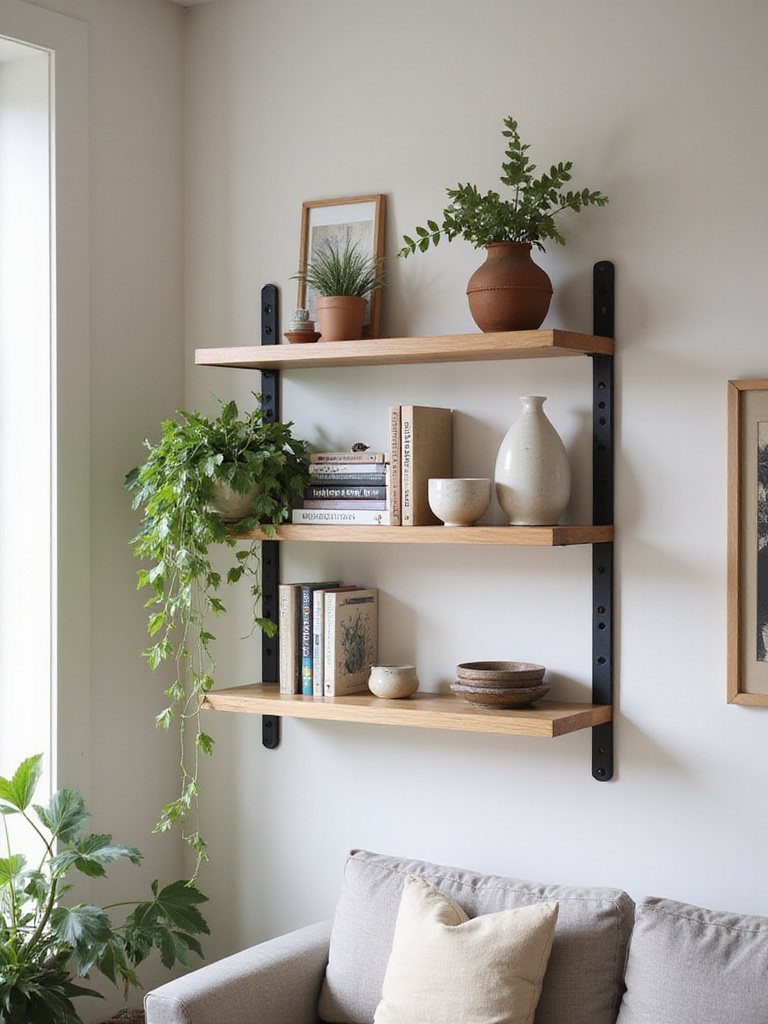
When styling shelves with a Mediterranean influence, incorporate ceramics in regional styles—perhaps blue and white Portuguese pottery, Majolica from Italy, or painted terracotta from Spain. Intersperse these with collected treasures like sea glass, interesting driftwood pieces, or vintage books about the region. The key is creating an arrangement that feels personally curated rather than perfectly matched—as if items were gathered over years of coastal exploration.
The cultural heritage preserved in each piece includes centuries of artistic tradition, from Moorish influences in Spanish ceramics to Greek motifs in Italian pottery. These authentic connections transform simple shelving into a cultural narrative that adds depth and meaning to your living room.
What makes Mediterranean accent chairs so distinctive? They often reference the region’s outdoor café culture with elements like bentwood frames, woven seats, or wrought iron details. These chairs aren’t just functional; they’re transportive pieces that evoke lazy afternoons in Italian piazzas or Greek tavernas. In my design practice, I often incorporate bistro-style chairs or low-slung rattan seats to capture that relaxed Mediterranean sensibility.
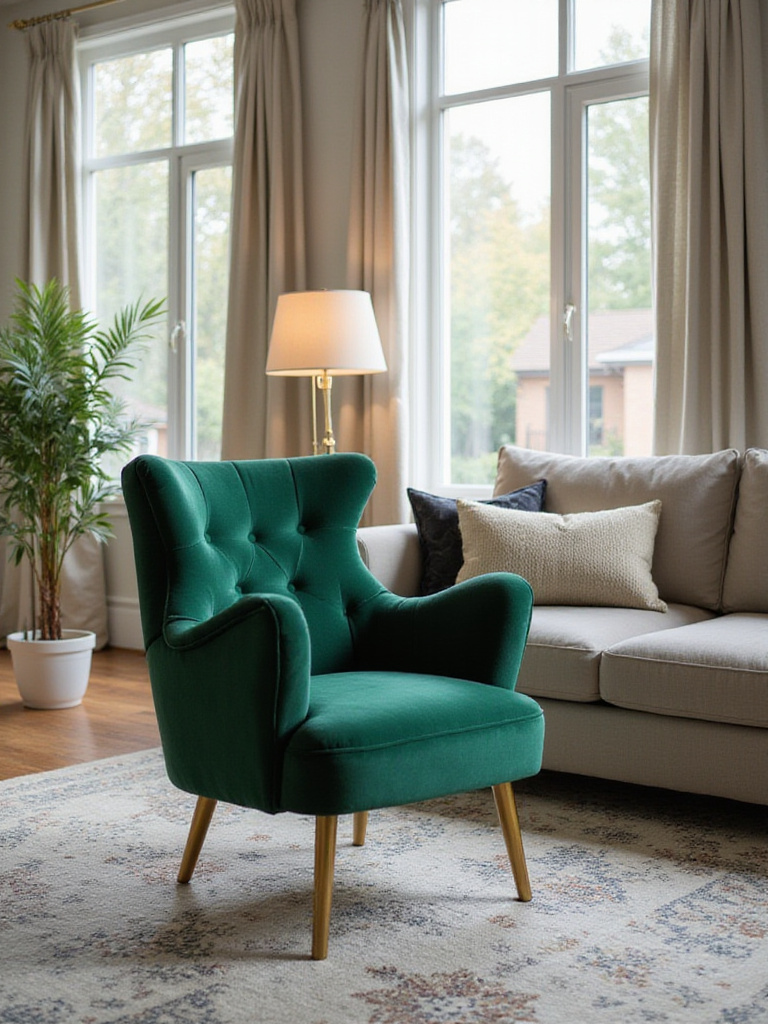
Choosing the right accent chair involves considering both aesthetics and comfort. Look for natural materials like wood, rattan, or metal with simple lines that won’t overwhelm your space. Colors typically stay neutral—natural wood tones or classic black metal—allowing the chair’s form and texture to take center stage. Cushions provide an opportunity to introduce regional textiles like suzani prints or simple linen in Mediterranean blues and terracottas.
The unexpected pairing that always works is combining these casual, café-inspired chairs with more substantial upholstered pieces—creating that collected-over-time feeling that defines authentic Mediterranean living room decorating ideas rather than matched sets bought all at once.
The three essential layers of lighting in Mediterranean-inspired living room decorating ideas begin with ambient light that mimics the region’s golden sunshine. Overhead fixtures with warm-toned bulbs create a base layer reminiscent of diffused Mediterranean daylight. Task lighting comes next—perhaps a reading lamp beside a favorite chair or an adjustable sconce above a collection of art books. Finally, accent lighting highlights architectural features or illuminates niches displaying collected treasures.
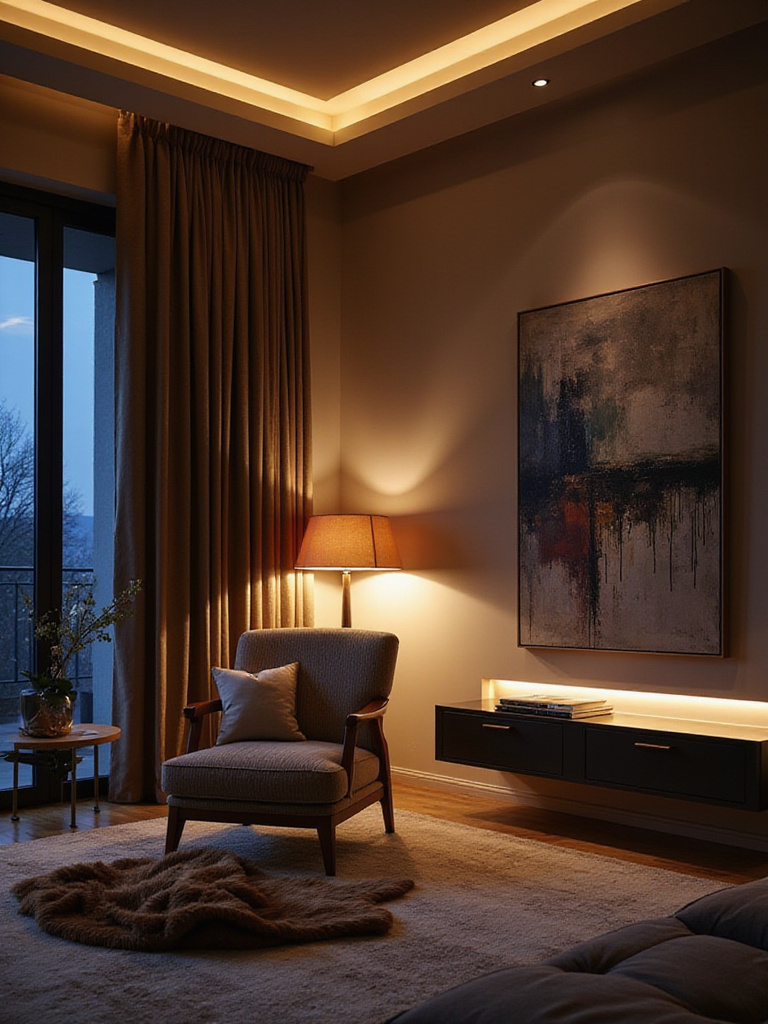
In Mediterranean homes, lighting fixtures themselves often become decorative elements. Consider wrought iron chandeliers with simple lines, ceramic table lamps in regional patterns, or pendant lights with woven shades that cast beautiful shadow patterns. The goal is creating that magical Mediterranean ambiance where light feels soft and flattering rather than harsh or institutional.
A good coffee table in Mediterranean-inspired living room decorating ideas goes beyond functionality to become a statement about regional materials and craftsmanship. Look for tables crafted from materials indigenous to the region—olive wood with its distinctive grain, limestone that references ancient ruins, or wrought iron with glass tops that feel at once substantial and airy. These authentic materials connect your living room to Mediterranean landscapes and traditions.
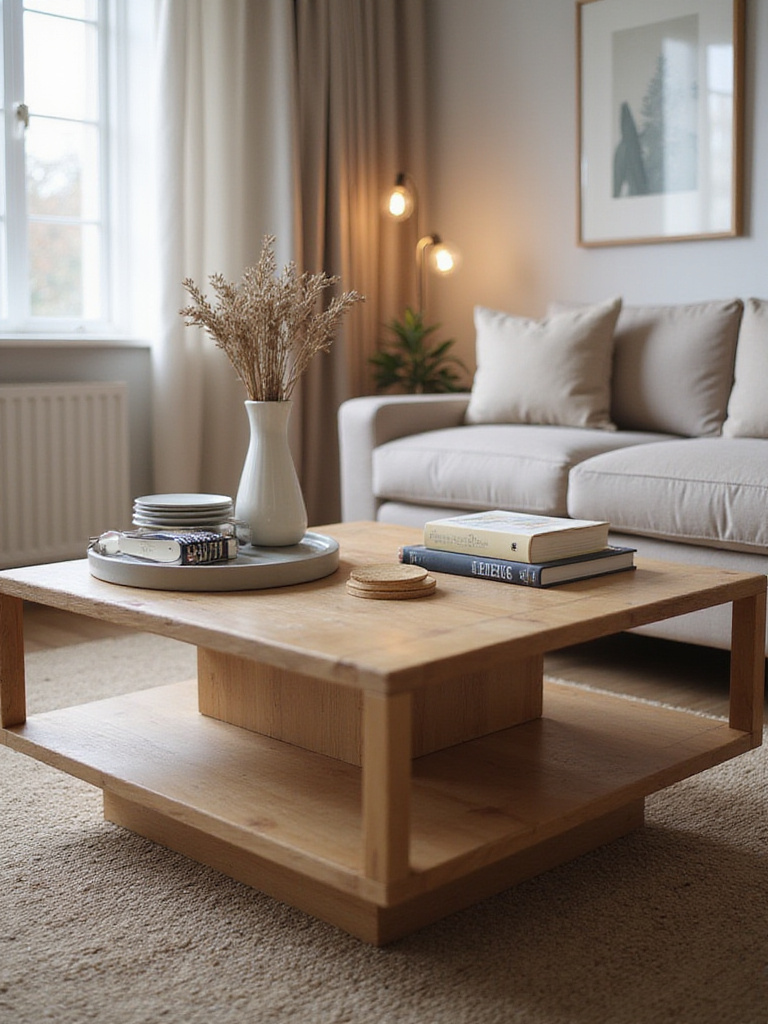
Beyond aesthetics, consider how Mediterranean coffee tables adapt to the region’s relaxed lifestyle. Many feature generous proportions for displaying books about regional architecture, art, and cuisine. Some incorporate storage for games that encourage lingering gatherings. The height should be comfortable for both practical use and putting up feet after a long day—capturing that Mediterranean appreciation for comfort and leisure.
The maker’s journey from apprentice to master influenced many traditional Mediterranean designs, where techniques passed through generations created pieces with soul and character. This connection to craft tradition gives your coffee table a depth of meaning beyond mass-produced alternatives.
Baskets offer a winning combination of style and practicality in Mediterranean-inspired living room decorating ideas. Throughout coastal Mediterranean regions, from Moroccan souks to Greek island markets, baskets have long served as both functional tools and decorative elements. These handcrafted pieces bring authentic texture while providing elegant Storage Solutions for everything from throw blankets to magazines.
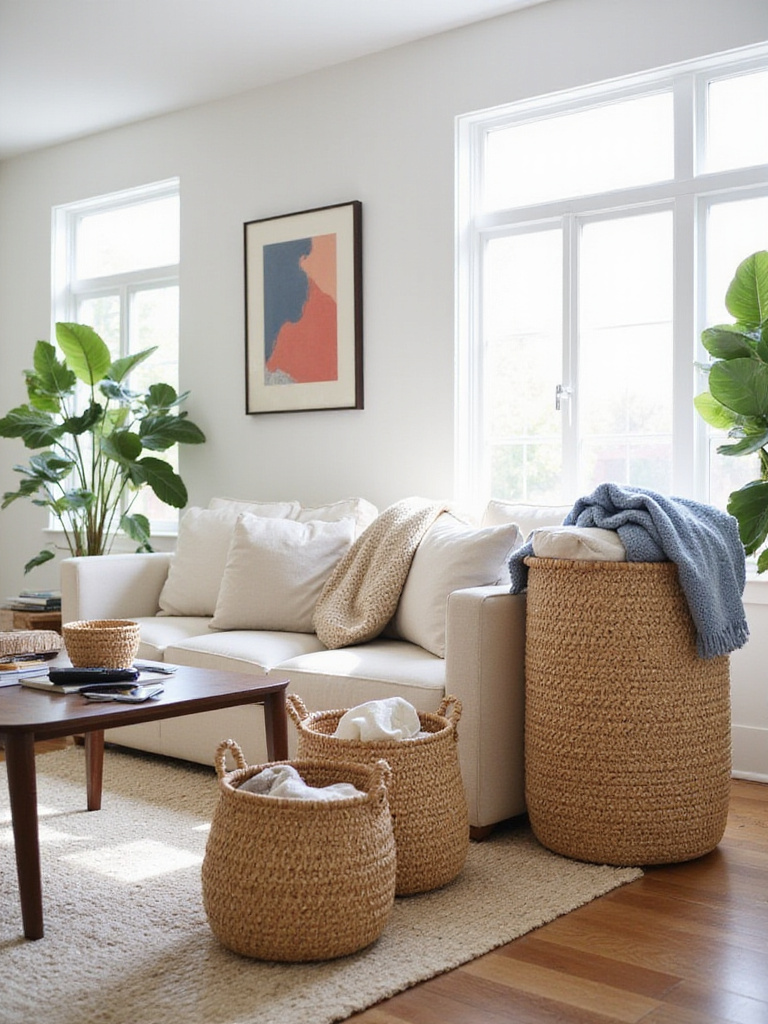
When choosing baskets for a Mediterranean-inspired living room, look for natural materials like olive branches, palm fronds, or sea grass—materials harvested and woven using techniques passed down through generations. Their organic textures and earthy tones complement the Mediterranean palette perfectly. Consider oversized market baskets beside sofas for blanket storage, shallow trays for corralling remote controls, or wall-hung specimens as textural art pieces.
Running your hand across this material reveals the skilled craftsmanship behind each piece—the tight weaving patterns, the natural variations in color, the subtle fragrance of sun-dried plant fibers. These sensory qualities connect your living room to ancient Mediterranean craft traditions while serving thoroughly modern storage needs.
Introducing natural elements into your Mediterranean-inspired living room creates an inherently calming atmosphere that references the region’s profound connection to landscape. Stone and wood have defined Mediterranean architecture for millennia—from marble columns of ancient Greece to rustic olive wood beams in Spanish farmhouses. These materials bring not just beauty but authentic regional character to living room decorating ideas.
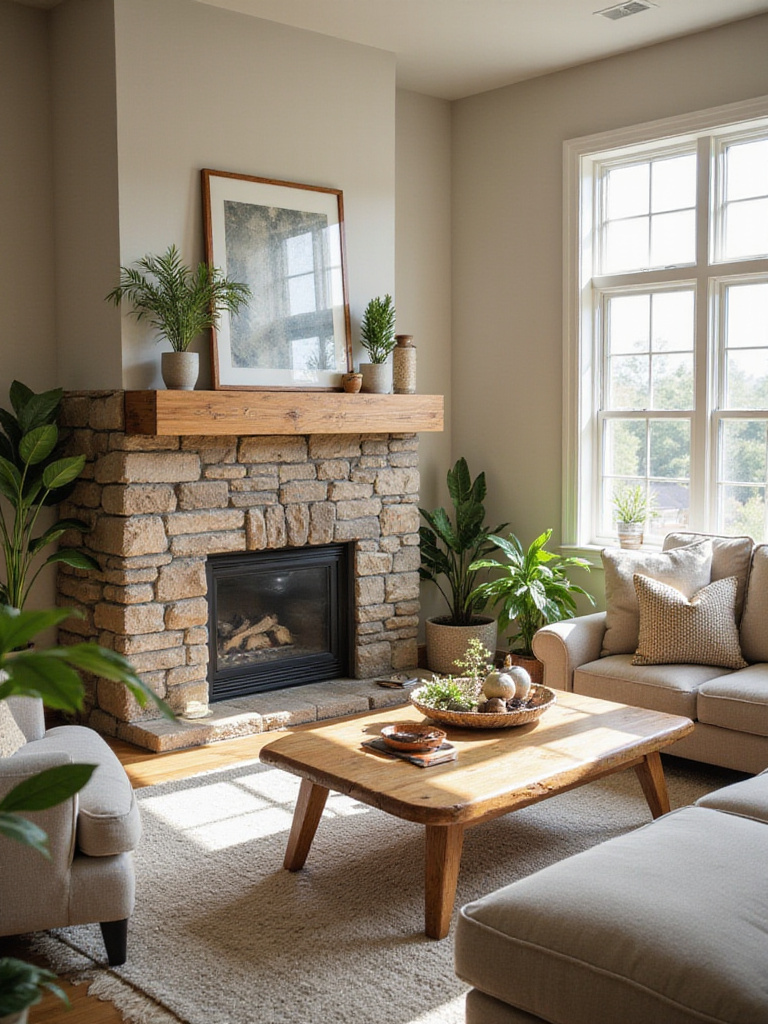
There are countless creative ways to incorporate these elements. Consider a stone accent wall in irregular limestone that recalls ancient village buildings. Expose wooden ceiling beams (or add faux ones) to reference traditional construction methods. Incorporate a reclaimed wood coffee table with visible knots and grain that tells the story of its previous life. Even smaller touches matter—perhaps stone coasters, wooden bowls collected from local artisans, or a substantial driftwood piece as sculptural art.
The environmental story behind these pieces began with sustainable harvesting practices that Mediterranean cultures developed over centuries. Many regional artisans still follow these traditions, creating pieces that honor both natural resources and cultural heritage—adding depth and authenticity to your living room’s Mediterranean story.
Personalization is the key to transforming a generically Mediterranean-styled space into an authentic reflection of your connection to the region. Family photos from Mediterranean travels, displayed in frames that reference regional crafts, create this perfect blend of personal history and design aesthetic. I often recommend frames with hand-painted ceramic tiles, mosaic details, or simple whitewashed wood that echoes coastal architecture.
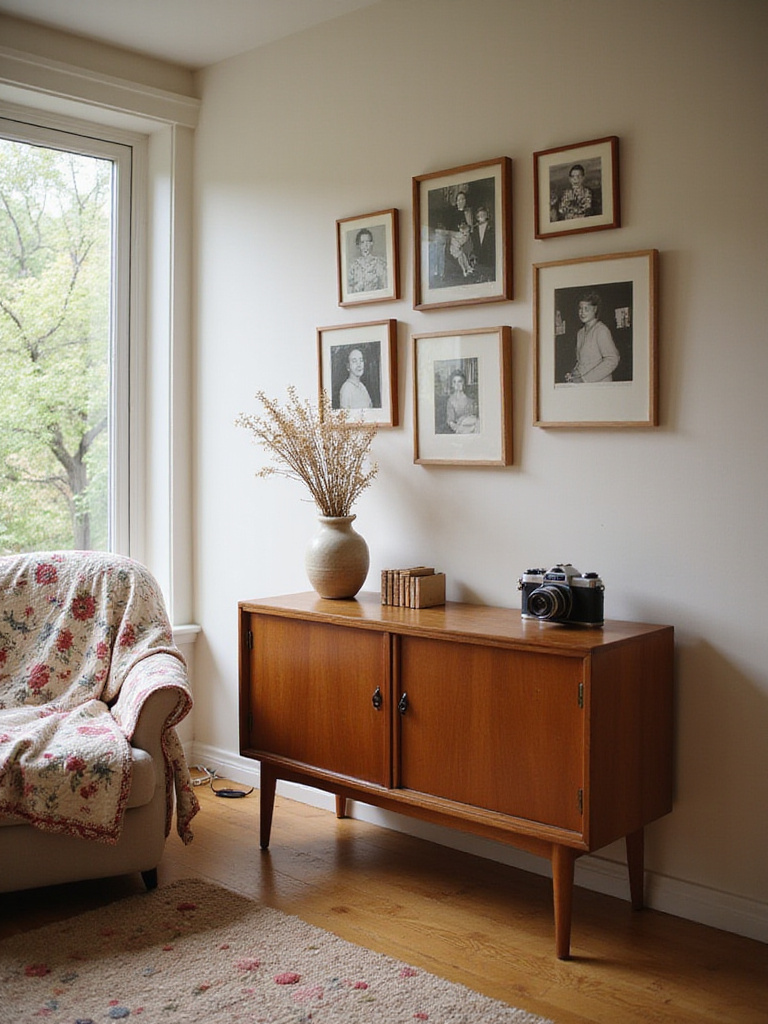
Incorporating family photos tastefully into Mediterranean living room decorating ideas is about achieving balance between personal expression and design cohesion. Consider converting color photos to sepia tones for a vintage Mediterranean feel, or create a curated collection of black and white images for sophisticated impact. Group photos from specific destinations—perhaps your travels through Provence or along the Amalfi Coast—to tell a cohesive story about your personal connection to these special places.
The styling mistake most people make is using generic frames that miss the opportunity to enhance the Mediterranean aesthetic. Instead, look for frames with subtle regional references—perhaps a blue trim reminiscent of Greek islands or warm terracotta tones that echo Italian countryside colors—to strengthen the design narrative while showcasing your most precious memories.
Gallery walls offer a fantastic way to deeply personalize your Mediterranean-inspired living room while showcasing the region’s distinctive landscapes and artistic traditions. Consider combining vintage travel posters celebrating classic destinations like the French Riviera or Greek Islands with contemporary photographs of Mediterranean architecture. Add botanical prints featuring regional plants like olive branches, bougainvillea, or lavender to reference the natural landscape.
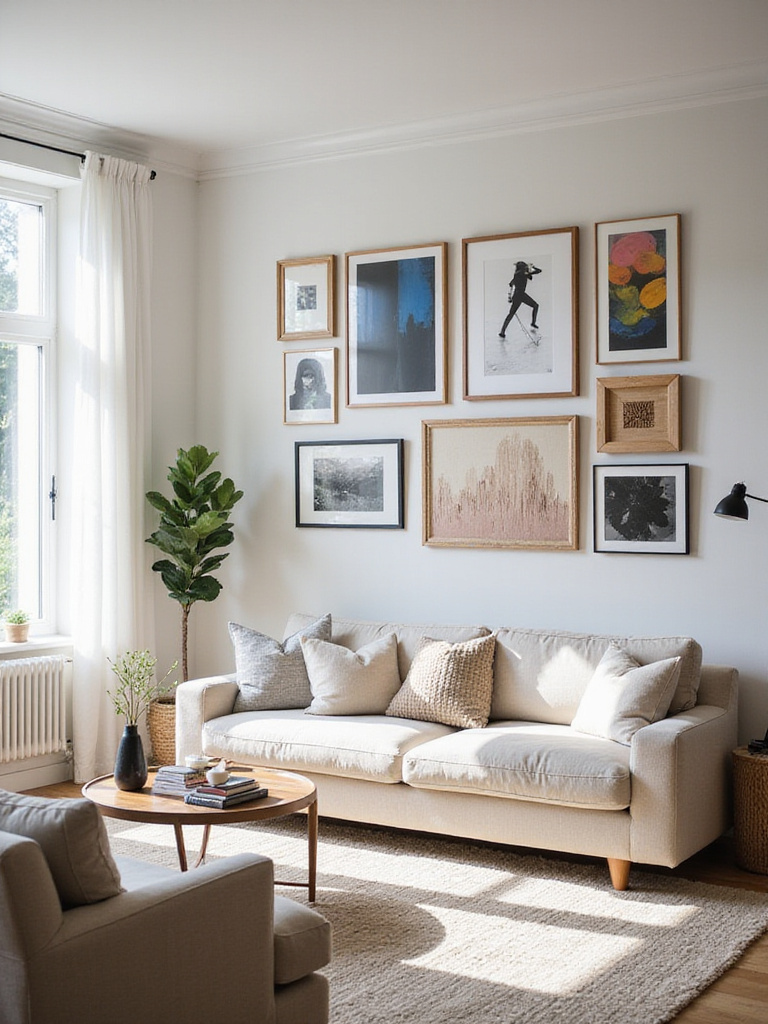
When creating a Mediterranean-inspired gallery wall, explore various themes that capture the region’s essence. You might focus on architectural elements—a collection of doorway photographs from different coastal villages, each with distinctive colors and details. Or consider a water-themed collection featuring different blues of Mediterranean seas and harbors. For a more abstract approach, gather images that explore the region’s distinctive quality of light—that golden glow that has inspired painters for centuries.
Unlike conventional options, this approach creates a deeply personal connection to Mediterranean aesthetics rather than generic “Mediterranean decor.” Your gallery becomes a visual journey through aspects of the region that specifically resonate with you, adding authentic character to your living room decorating ideas.
Throw pillows are design chameleons in Mediterranean-inspired living room decorating ideas, offering an affordable way to reference specific regional textiles and patterns. Look for pillows featuring traditional motifs like Greek key patterns, Portuguese tile designs, or Moorish geometric prints. These distinctive patterns instantly communicate Mediterranean influence while adding visual interest to neutral furniture.
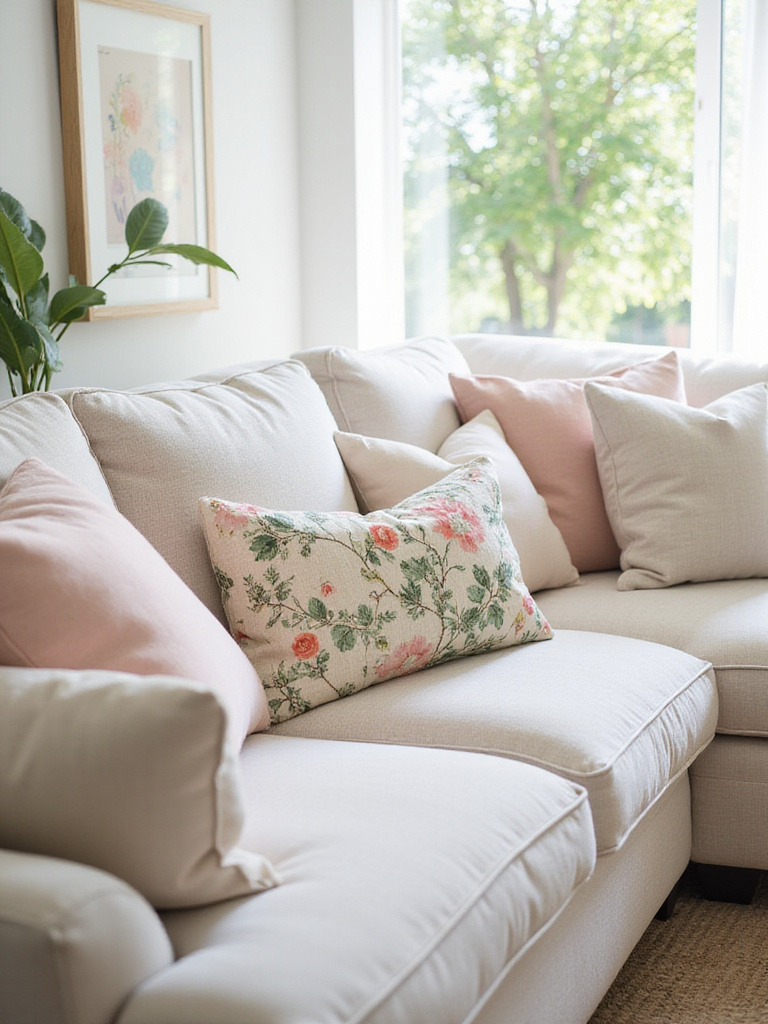
The textiles themselves tell stories of regional craft traditions. Consider handwoven kilim pillow covers from Turkey, embroidered suzani fabrics from the eastern Mediterranean, or simple linen with blue stripes reminiscent of French coastal homes. The changing seasons offer opportunities to rotate your Mediterranean palette—perhaps deeper blues and terracottas for winter, shifting to lighter aquas and corals for summer months.
The sustainable journey of these textiles involves traditional production methods that have minimal environmental impact compared to mass-produced alternatives. Many Mediterranean textile traditions rely on natural dyes, hand-looming, and small-batch production—practices that support artisans while creating uniquely beautiful additions to your living room.
Area rugs are remarkably effective for delineating different functional areas within a Mediterranean-inspired living room, particularly in open-plan spaces. A distinctive rug with geometric Moroccan patterns might define the main seating area, while a smaller rug with subtle Greek key borders could anchor a reading nook. These textural boundaries create visual organization while adding authentic regional character to your living room decorating ideas.
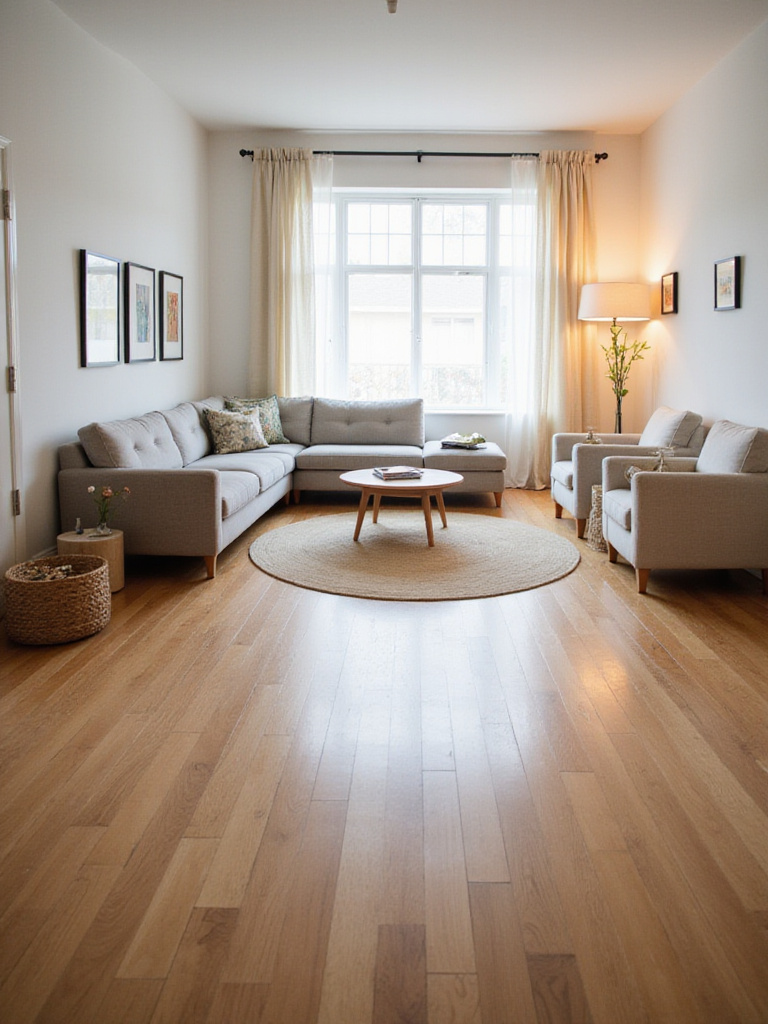
Choosing the right size and pattern for each zone requires balancing visual impact with practical considerations. For a primary seating area, select a generously sized rug with a pattern scale appropriate to your space—larger rooms can handle bold, larger-scale patterns, while smaller spaces benefit from more delicate, smaller-scale designs. The colors should connect to your overall Mediterranean palette while the pattern references specific regional traditions—perhaps Spanish tile motifs, Turkish kilim patterns, or Italian terrazzo-inspired designs.
The artisan collective that creates these pieces often follows techniques passed down through generations, resulting in rugs that carry cultural significance beyond mere decoration. These authentic connections transform simple floor coverings into storytelling elements that ground your Mediterranean design narrative.
The most inviting Mediterranean-inspired reading nooks capture the region’s appreciation for simple pleasures and connection to natural elements. Begin with comfortable seating positioned to maximize natural light—perhaps a cushioned window seat or a low-slung chair with curves reminiscent of coastal architecture. Layer with textiles that reference specific Mediterranean regions—a throw in Sardinian weaving patterns or pillows with Provençal lavender motifs adds authentic character.
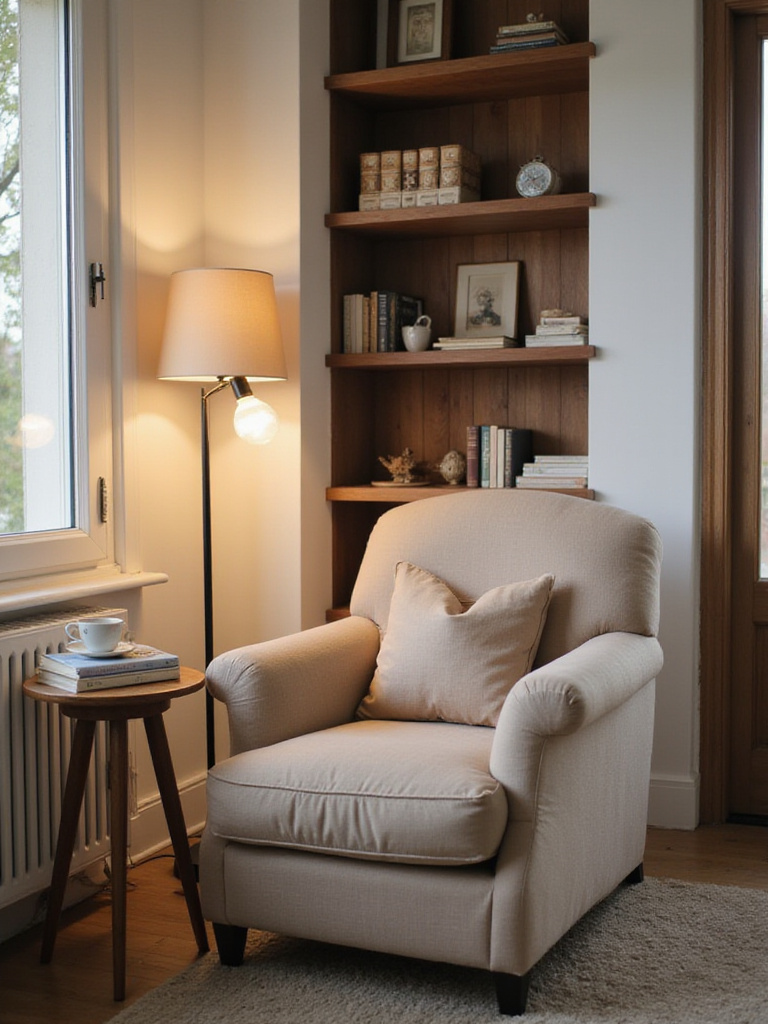
Maximizing space while creating this cozy retreat requires Mediterranean-inspired efficiency. Consider built-in solutions like a bench with storage underneath for books and magazines. Wall-mounted shelving keeps reading materials accessible without consuming floor space. A small side table, perhaps a Moroccan brass tray table or a simple ceramic garden stool, provides just enough surface for essentials without overwhelming the area.
When clients ask us about balancing style with comfort, I recommend embracing the Mediterranean philosophy of everyday luxury—where beauty and function coexist in perfect harmony. This approach creates reading nooks that feel special without being precious, inviting daily use rather than occasional enjoyment.
Small decorative elements are crucial for elevating a Mediterranean-inspired living room from merely themed to truly authentic. Handcrafted ceramics—perhaps majolica plates from Italy, painted bowls from Spain, or simple terracotta vessels from Greece—add distinctive color and craftsmanship. Arrange these pieces thoughtfully on coffee tables, open shelving, or mantels where their details can be appreciated.
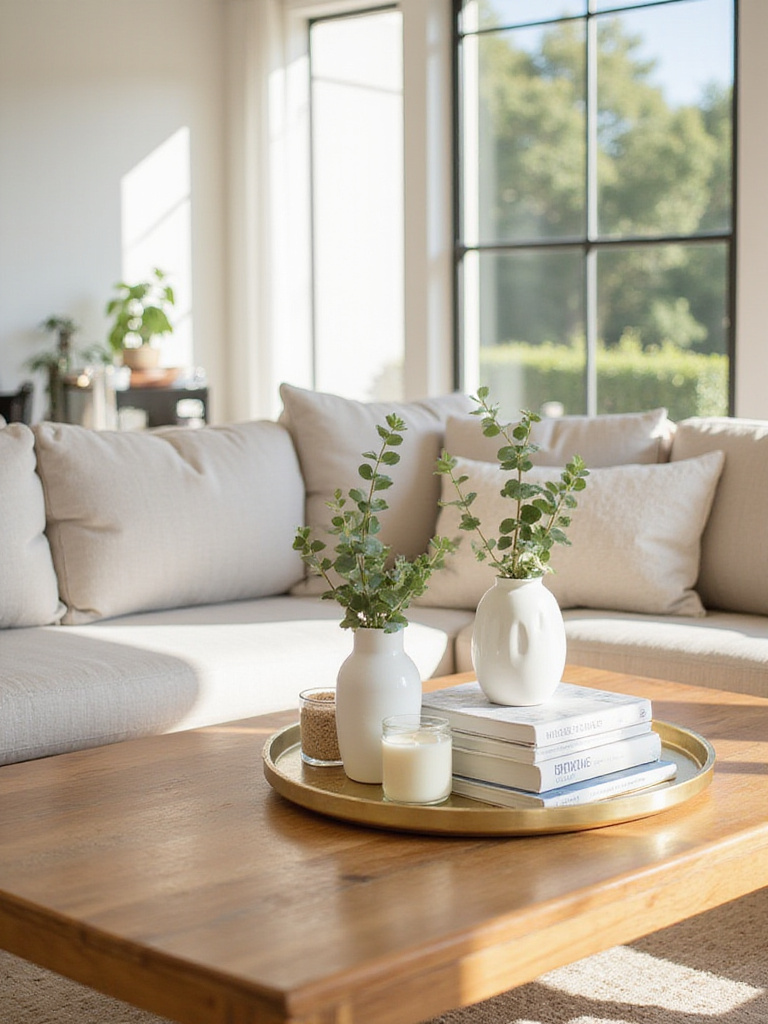
Effectively using these accessories involves considering their regional origins and personal significance. Rather than generic “Mediterranean” items, seek pieces with specific provenance—perhaps olive wood bowls from a specific Greek island you visited or hand-painted ceramics from a particular Spanish village. Group items with visual connections—similar colors, complementary shapes, or shared origins—to create cohesive vignettes that tell a regional story.
The unexpected environmental benefit comes from these handcrafted items’ longevity and timeless appeal. Unlike mass-produced decorative objects that quickly feel dated, authentic Mediterranean pieces age beautifully and remain relevant through changing trends—a sustainable approach to living room decorating ideas that reduces consumption while surrounding you with genuine beauty.
The Mediterranean approach to living spaces celebrates the art of everyday life—where beauty and function intertwine, where materials tell stories of landscape and tradition, and where homes evolve organically rather than following rigid trends. By incorporating these 21 living room decorating ideas inspired by Mediterranean coastal homes, you’re not just creating a beautiful space—you’re embracing a philosophy that values authenticity, comfort, and connection.
Remember that the most captivating Mediterranean-inspired living rooms don’t look designed—they feel discovered, as if each element found its perfect place naturally over time. Let your space evolve, adding pieces that speak to you personally while maintaining that distinctive Mediterranean warmth and welcome. Your living room will become not just a showcase of regional aesthetics but a true reflection of your own connection to the sun-drenched cultures of this magical region.